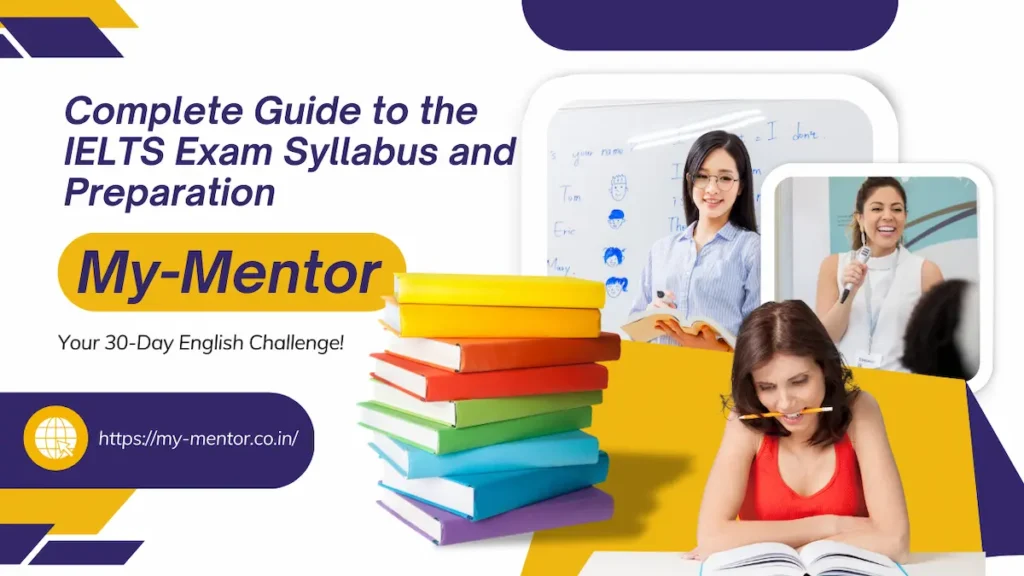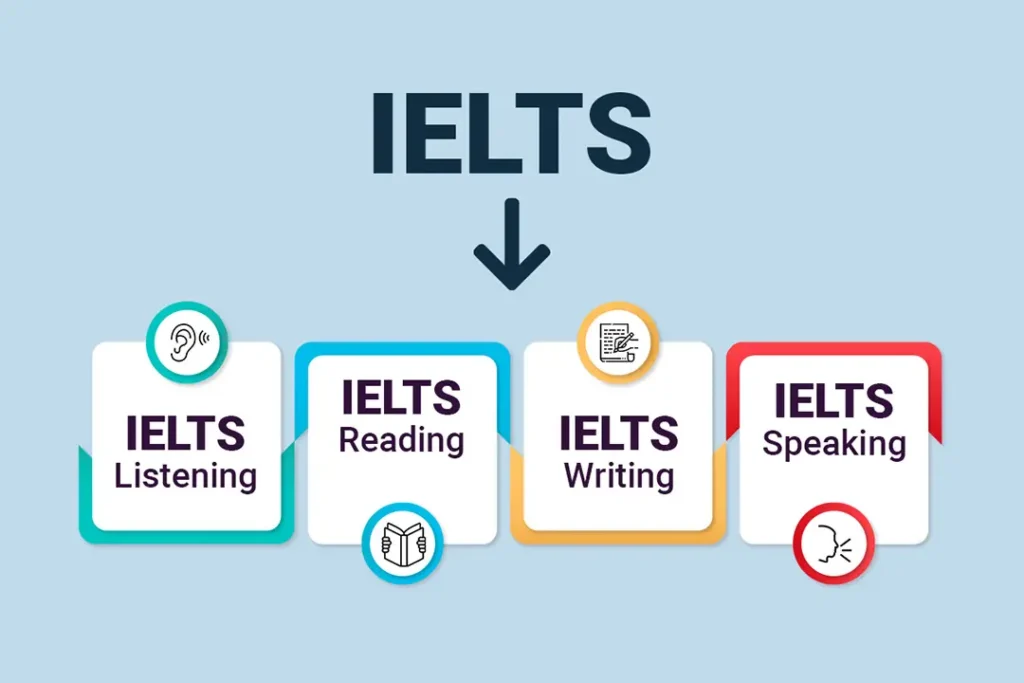IELTS (International English Language Testing System) is an English language proficiency test to check your English language skills. This exam is a must to take before entering any English-speaking country (generally for English-speaking countries).
Who does not want to live or experience their dream country? If you are also aiming to study or settle down abroad. Only good IELTS scores can open the doors to your dream country. But before directly going for the exam or preparation, one must know the IELTS exam syllabus and preparation tips.

In this blog, you will know in depth about the IELTS exam syllabus, preparation for IELTS, types of IELTS exam, and how to register for the IELTS exam.
What is an IELTS exam?
An IELTS stands for the International English Language Testing System exam. This exam becomes a must if you are planning to study abroad. Not only important for study, but also for migration purposes too.
The score of this is measured on a band. The band scores decide your English language skills. It is widely accepted for study, work, and migration purposes in countries like the UK, USA, Canada, Australia, and New Zealand. Generally, it is crucial in English-speaking countries.
The IELTS exam syllabus and Preparation structure: Listening, Reading, Writing, and Speaking

The IELTS exam syllabus is divided into four categories: Listening, Reading, Writing, and Speaking. Questions are asked according to these four major categories during the IELTS exam. However, this exam can be taken in online or offline mode. The speaking session is always done personally in one conversation.
| Test Component | Academic IELTS | General Training IELTS | Time Allotted |
| Listening | 4 sections, 40 questions | 4 sections, 40 questions | 30 minutes |
| Reading | 3 passages, 40 questions | Multiple texts, 40 questions | 60 minutes |
| Writing | Task 1: Describe data; Task 2: Essay | Task 1: Write a letter; Task 2: Essay | 60 minutes |
| Speaking | Part 1: Background; Part 2: Topic; Part 3: Discussion | Part 1: Background; Part 2: Topic; Part 3: Discussion | 11-14 minutes |
IELTS exam syllabus guide
Before sitting in the examination, one should fully consider the IELTS exam syllabus. As it might seem easy, it takes a certain time and a specific IELTS exam syllabus to meet your IELTS score expectations.
1- Listening
The duration for listening is 30 minutes, consisting of a total of 40 questions. The format is divided into 4 recordings (2 monologues and 2 conversations).
Note that these recordings will be played only once. The accents that are included for recordings are British, Australian, New Zealand, and North American.
Part 1– will include a conversation between 2 people in an everyday social context. E.g., a conversation between a waiter and a customer at a cafe.
Part 2 – includes a monologue also in an everyday social context. E.g., giving directions for the supermarket from the train station.
Part 3 – covers a conversation between 4 people and is generally related to educational or training topics. E.g., group discussion in a university for a project meeting.
Part 4 – adds a monologue on an academic subject. E.g., university lecture excerpt.
2- Reading
The duration for reading is set for 60 minutes, consisting of 40 questions. The format for reading is to test different reading techniques, such as identifying opinions, attitudes, and the purpose of the writers.
This section consists of long passages related to the general interest of students. The text will be in different styles, such as diagrams, graphs, or illustrations, from sources such as books, journals, or newspapers.
3- Writing
The writing section duration is set to 60 minutes. One should note that it does not include any multiple-choice questions, and students are expected to write at least 250 words in 40 minutes.
There are two tasks divided into Task 1 and Task 2.
Task 1- includes graphs, tables, charts, or diagrams, and students are expected to write 150 words in 20 minutes.
Task 2 – includes a discussion on point of view, argument, and problems.
4- Speaking
Duration for speaking is generally 11-14 minutes, and there is no number of questions. The format for speaking is simple; students are required to give 11-14 minutes. It is crucial for testing the English-speaking skills of the students, and it is recorded for assessment purposes.
Divided into three parts-
Part 1 (4-5 minutes), the examiner asks you to speak about yourself and familiar topics like home, family, work, hobbies, and studies.
Part 2 (3-4 minutes) examiner gives a card that consists topic where you are given 1 minute to think about the topic and expected to speak for 2 minutes on that topic.
Part 3 (4-5 minutes) examiner asks connected questions related to the topic given in Part 2.
So, this is the whole IELTS exam syllabus one needs to focus on to achieve their desired band score.
Types of IELTS exam
There are several types of IELTS exams, just like the IELTS exam syllabus, all for different purposes, and individuals take those exams according to their needs.
- IELTS academic exam: This exam is mainly taken by students who are willing to study abroad. It includes listening, writing, reading, and speaking with a prominence on academic language and tasks.
- IELTS general training exam: IELTS general training exams are for those who are migrating for work and settlement purposes. Such as individuals seeking jobs and citizenship opportunities there.
- IELTS for UKVI: IELTS for UKVI represents those who are applying for a UK visa. English language proficiency is required for Visa applications to the UK, and it is accepted by the UK visa. It is crucial for those who are immigrating to the UK.
- IELTS for Life Skills: Another IELTS exam type is for life skills. This test is taken to prove English language ability for Visa purposes. Applicable for family and settlement routes. The exam assesses listening and speaking, categorised into two levels. A1 (for family route) and B1 (for settlement routes).
How to register for the IELTS exam?
Steps to Register for the IELTS Exam
Choose the type of test
- IELTS Academic or IELTS General Training.
- Also decide between IELTS on Paper and IELTS on Computer.
Visit the official IELTS website
- Go to ielts.org or the website of official partners (IDP IELTS India or British Council in other countries).
Find a test location/date
- Enter your city and select a nearby test center.
- Check available test dates and time slots.
Create an account
- Sign up with your email ID and personal details.
Fill the application form
- Provide details like passport number, address, and test module (Academic/General).
Upload documents
- A clear scanned copy of your valid passport (mandatory for Indian test-takers).
Pay the test fee
- In India, the IELTS test fee is about ₹17,000 (may vary slightly).
- Pay online using debit/credit card, net banking, or UPI.
Receive confirmation
- You’ll get an email with your test date, venue, and candidate number.
- A week before the exam, you’ll also receive details about the Speaking test schedule (may be on a different day).
Book your session
Ready to take the next step? Connect with My Mentor today for clear guidance, practical tips, and personalized support to reach your goals.
Learn More– Best IELTS Coaching in Lucknow: How to Choose the Right Institute
Conclusion
IELTS is the gateway to your dream of studying, working, or settling abroad. It tests you in listening, reading, writing, and speaking, and each part is equally important.
Before you jump into preparation, make sure you know the syllabus, exam format, and which type of IELTS you need. A clear understanding of these basics will save you time and effort.
With the right plan and consistent practice, achieving a good band score is absolutely possible. Remember, IELTS is not just a test; it is the first big step towards your future in an English-speaking country.
(FAQs)– IELTS Exam Syllabus and Preparation
1. How many times can I take the IELTS exam?
You can attempt IELTS as many times as you want. There is no limit, but you need to pay the test fee each time.
2. How long is the IELTS score valid?
The IELTS score is valid for 2 years from the date you take the exam.
3. What is the difference between IELTS Academic and IELTS General Training?
Academic IELTS is for students planning to study abroad, while General Training is for those who want to migrate for work or settlement.
4. Can I change my IELTS test date after booking?
Yes, you can request rescheduling, but it should be done at least 5 weeks before your test date. Extra charges may apply.
5. Do I need a passport for IELTS registration?
Yes, a valid passport is mandatory for registration as well as for appearing in the exam.
6. Is IELTS difficult to pass?
IELTS is not about passing or failing. It is about your English language level. With proper preparation and practice, you can achieve your target band score.
.